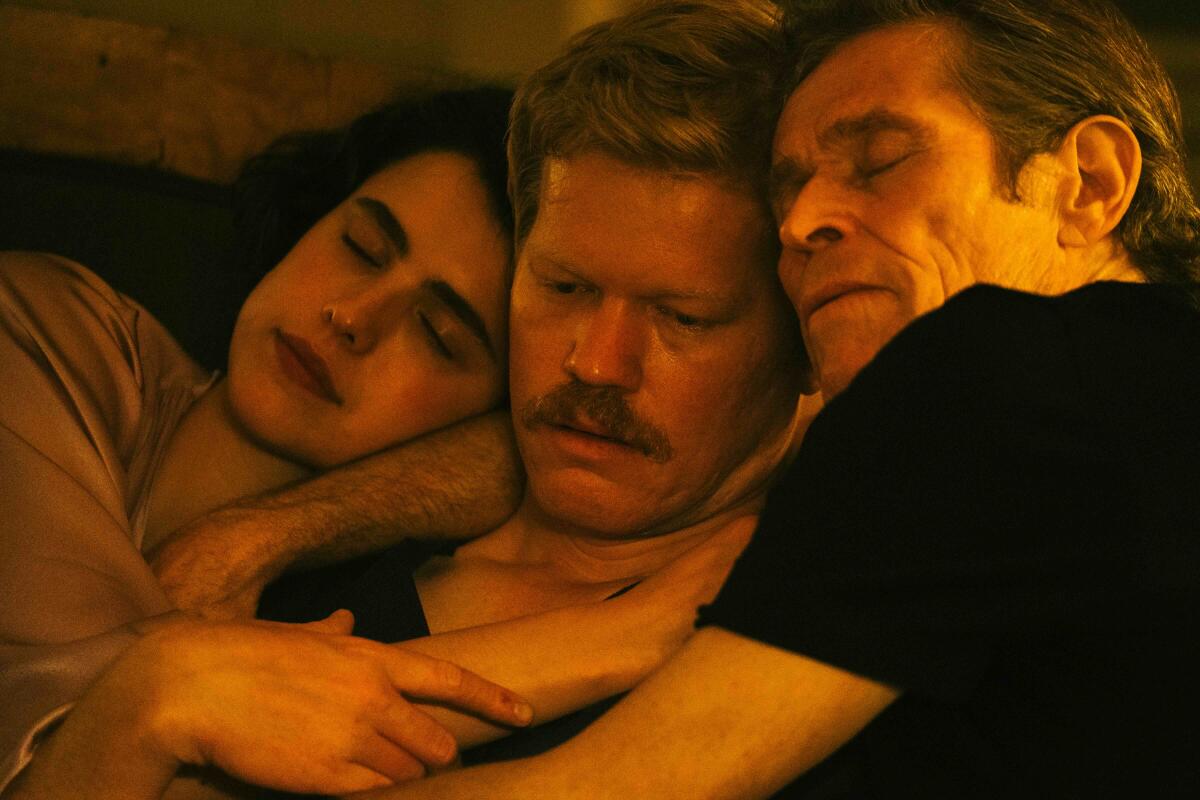‘Kinds of Kindness’ star Jesse Plemons opens up about losing weight and that ‘Civil War’ cameo

- Share via
CANNES, France — Jesse Plemons is deliriously tired.
Draped across a sofa at Cannes’ ritzy Carlton Hotel with his legs outstretched, backlit by the late-afternoon Mediterranean sun, the actor apologizes for losing his train of thought on occasion, or tripping over the odd sentence.
I cannot blame him. It has been a long five years.
Of course, Plemons, 36, is likely just hitting the film-festival wall. He’s fresh off the world premiere of his new film “Kinds of Kindness,” the social rigors of the Croisette party circuit, a press conference and an hours-long junket.
But he’d have to be at least a little worn out going in from his meteoric rise: Since I last interviewed him for The Times in 2019 — for a piece headlined, in retrospect erroneously, “Being one of TV’s best character actors suits Jesse Plemons just fine” — he’s worked with acclaimed filmmakers Jane Campion, Martin Scorsese, Alex Garland and Yorgos Lanthimos, earned his first Oscar nomination and third Emmy nod and, a week after our conversation, walked away with Cannes’ best actor prize. Not that he planned it that way.
“It’s just a survival technique,” Plemons, who broke through as a teenager in NBC’s high-school football saga “Friday Night Lights,” says of his reluctance to plot out career moves. “I’ve been doing it for so long that it almost doesn’t benefit to look too far ahead. And that’s kind of worked for me so far ... I’m constantly just looking at this next thing and following my gut [about] what is interesting and exciting to me.”
In Netflix’s “El Camino: A Breaking Bad Movie,” Jesse Plemons reprises his role as the unsettling Todd Alquist and reaffirms his status as a standout.
With “Kinds of Kindness,” Lanthimos’ follow-up to last year’s Oscar-winning “Poor Things,” that excitement came in the form of productive anxiety for Plemons, who at times found himself unmoored by the Greek filmmaker’s “unusual” approach. Consider his rehearsals, which to hear Plemons’ description are more like a destabilizing boot camp for actors than a run-through of the script.
“You’re mainly playing these games,” Plemons recalls, “doing these theater exercises that he’s picked up, developed, made up over the years, and my takeaway that first or second day was, ‘Is the whole point of this just to make me feel completely lost? Is that why we’re doing this? Because it’s working.‘” He disputes the characterization that Lanthimos is intentionally obtuse or withholding. “You reach a point of ‘F— it!’ and it becomes so much fun and so liberating and so exhilarating and you start to realize, ‘This is going to be a completely different way of working.’ You’re still doing the same thing, but the rules don’t necessarily apply in the way they usually do.”
That freedom may explain why Lanthimos, reuniting here with “Dogtooth” and “The Lobster” co-writer Efthimis Filippou, has been able to assemble a recurring company of players, including Emma Stone, Willem Dafoe, Margaret Qualley and now Plemons. (The actor has already signed on for Lanthimos’ next feature, the thriller “Bugonia,” a remake of the Korean film “Save the Green Planet.”)
“Kinds of Kindness,” in theaters June 21, casts the above performers, along with Hong Chau, Mamoudou Athie, Joe Alwyn and Hunter Schafer, in three separate stories, closer in tone to the misanthropic chill of “The Killing of a Sacred Deer” than the more buoyantly absurdist, if still offbeat, “Poor Things” or “The Favourite.” As a man who pays the price for standing up to his boss, another struggling to cope with his wife’s return from a near-death experience and a third eager to curry favor with the leaders of a cult, Plemons emerges alongside Stone as the film’s co-lead. Although “Yorgos kept insisting it was a comedy,” as Plemons deadpans to me at one point, the subject matter roiling underneath the stories’ anodyne log lines — forced sterilization, cannibalism, sexual assault — unsettled him as much as it will the viewer.

”The second one got under my skin pretty intensely and just left me feeling a little sick,” he says of the chapter titled “R.M.F. Is Flying,” which inverts the trope of the doting wife praying for her husband’s survival and then takes it to twisted extremes. “Not just because of the body horror but — again, what I think is so amazing about [Lanthimos’] work is it has the ability to really evoke very intense feelings and emotions that are hard to even sort through and articulate in your head. That was kind of the way I felt after reading the script, this sick to my stomach feeling. Not that I wasn’t incredibly excited, but that one there was something really kind of insidious about that effect.”
One unexpected through line among Plemons’ characters in the film is an attention to their physical appearance that at first concerned the actor, who lost weight before being approached for “Kinds of Kindness” and worried Lanthimos wanted “the bigger me.” In the first segment, “The Death of R.M.F.,” Plemons’ corporate functionary submits to a strict regimen established by his controlling employer (Dafoe), who quips, “Skinny men are the most ridiculous thing there is”; in the third, “R.M.F. Eats a Sandwich,” he’s clad in a suit so baggy it seems designed to draw attention to the actor’s thinness. The transformation ended up working for the project, Plemons says, but he is already resigned to the speculation about how he achieved it.
“It’s really unfortunate that I decided to get healthy when everyone decided to take Ozempic,” he says. “It doesn’t matter, everyone’s going to think I took Ozempic anyways. But what it was was getting older and — I hate even getting specific because then it turns into a whole thing, but there was a part that I did that in my mind I could not imagine him as the size that I was. Several people talked to me about intermittent fasting and I just gave it a shot and [was] surprised at how quickly it was effective. So I lost a little bit before I did that part and then felt like I was in the rhythm, I was feeling better, and something shifted in my head. I just sort of got a handle on it.”
That part generated perhaps the most talked-about single scene in American movies so far this year: Plemons’ unnerving cameo as a mercurial soldier standing guard over a mass grave in Garland’s “Civil War.” The actor, who had just spent months shooting the miniseries “Love & Death,” was ready for a break with his kids while wife Kirsten Dunst filmed the speculative photojournalism drama in Atlanta. Then she called and asked him if he would take on the role after another actor dropped out.
With a deeply disturbing turn by Jesse Plemons, one scene in “Civil War” encapsulates the film’s combustible political balancing act. It almost didn’t happen.
“There was a part of me that was kind of like, ‘Oh, God,’ because that scene, even reading the script, is — I mean, the ‘gulp’ moment when your stomach drops and you feel the whole energy of the story shift.”
Given the crash circumstances in which he inherited the role, the intensity of Plemons’ preparation is striking: In short order, he not only trimmed down to play the part, but also read Lt. Col. Dave Grossman’s famed analyses of soldier behavior “On Killing: The Psychological Cost of Learning to Kill in War and Society” and its sequel “On Combat: The Psychology and Physiology of Deadly Conflict in War and in Peace.” He was inspired, he says, by Garland’s depth of knowledge about real-life scenarios involving “rogue soldiers that have been out too long,” which in turn informed the selection of the character’s much-remarked-upon red sunglasses.
“[Garland] also talked about the structure of ‘Apocalypse Now,’ which also deals with these types of soldiers and the idea that they all start off looking as traditional as you imagine and over time they start morphing and their appearances start changing and they start picking things up.”
Just as “Breaking Bad’s” Todd Alquist roused me to praise Plemons’ outsize influence on any scene he appears in, his small but potent performances in “Civil War” and “Killers of the Flower Moon” — as a federal agent looking into a series of suspicious Native American deaths — have led film fans on social media to anoint Plemons with the character actor’s highest praise: You know a movie’s gonna get good when this guy shows up.

Plemons’ friends have shown him the memes, which he good-naturedly laughs off, but he no more plans to receive such a reaction than he does his five-year career trajectory. He’s in it, he says, for the variability of it all — different roles opposite different co-stars under different directors, who possess different “personalities and instincts and sensibilities.” (Among those he’d like to add to his resume: Sean Baker, recent Palme d’Or winner for “Anora,” “Bird’s” Andrea Arnold and the Safdie brothers.)
A committed cinephile who studied Scorsese’s “The King of Comedy” before filming “Kinds of Kindness” and spends a portion of our interview recommending Bill Douglas’ little-known trilogy of black-and-white shorts about a boy coming of age in a Scottish mining town, Plemons’ desire to stretch himself creatively appears to be his only hard-and-fast rule in selecting projects.
“Micromanaging or too much judgment too early on is not helpful,” he says. “There has to be a little period of discovery and finding it and experimenting, even if it’s just a take or two before we come in and try to make some definitive answer.”
As long as it provides this sort of running room, he’s game for whatever comes his way — even the “character actor” label that’s stuck with him through a remarkable run of film and TV work.
“Those are always the actors that I admired and was always inspired by,” he says. “I wouldn’t say I care too much about categorizing one way or the other, but I am someone who doesn’t really care about the size of the part.”
This lack of ego explains why Plemons has been booked solid since the last time we talked. What filmmaker wouldn’t want to work with an actor who’ll turn an uncredited cameo into a cultural moment, or throw himself headlong into a rehearsal process he doesn’t even understand?
Just one request, from those of us eager to ensure he can keep making movies better for the next five years: Give the guy time for a nap.
More to Read
Only good movies
Get the Indie Focus newsletter, Mark Olsen's weekly guide to the world of cinema.
You may occasionally receive promotional content from the Los Angeles Times.













